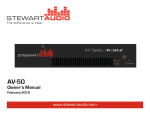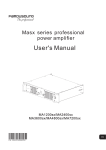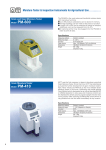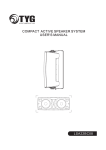Download CVA 7400-7800 - Manual
Transcript
The Undisputed Leader In High Speed Switching Power Supply Technology Sales and Factory Service: Stewart Audio, Inc. 14397 Cuesta Court Suite D1 Sonora, CA. 95370 (209) 588-8111 Fax (209) 588-8113 PROFESSIO NAL CONTRACTOR SERIES CVA-7400/CVA-7800 Professional Power Amplifier Owner’s Manual AMPLIFIERS Specifications CVA-7800 FTC Power Rating <.1%THD. 35Hz-20kHz (both channels driven) [email protected] volts per channel Frequency Response +0dB, -0.5dB Bandwidth +0dB, -3.0dB 35Hz - 20kHz 35Hz - 20kHz Signal-to-Noise (A Weighted, [email protected]? ) Input Impedance >100dB 20K? Input Sensitivity ([email protected]? ) 1V(0dBV) Slew Rate <30V/microsecond Damping Factor <200 Input Connectors 3-pin XLRBarrier Strip Output Connectors 6-Gauge, 5-Way Binding Post Voltage Gain 40x (32dB) Power Requirements (1/8 Power) 120C AC 3A Power Supply Design High Speed Switching Dimensions Weight Height Width Depth behind front panel 17 1.75 in (4.5cm) 19 in (48.3 cm) 15.3 in (38.9 cm) 14.8 in (37.6 cm) 11 lbs (5kg) Specifications CVA-7400 FTC Power Rating <.1%THD. 35Hz-20kHz (both channels driven) [email protected] volts per channel Frequency Response +0dB, -0.5dB Bandwidth +0dB, -3.0dB 35Hz - 20kHz 35Hz - 20kHz Signal-to-Noise (A Weighted, [email protected]? ) Input Impedance >100dB 20K? Input Sensitivity ([email protected]? ) 1V(0dBV) Slew Rate <30V/microsecond Damping Factor <200 Input Connectors 3-pin XLRBarrier Strip Output Connectors 6-Gauge, 5-Way Binding Post Voltage Gain 40x (32dB) Power Requirements (1/8 Power) 120C AC 3A Power Supply Design High Speed Switching Dimensions Weight Height Width Depth behind front panel 1.75 in (4.5cm) 19 in (48.3 cm) 15.3 in (38.9 cm) 14.8 in (37.6 cm) 10 lbs (5kg) Congratulations! You have purchased a powerful product which will provide you with many years of reliable service. Stewart Audio’s, committed to innovation in design and quality workmanship, has provided its customers with a unique combination of performance and reliability. This philosophy has attracted the attention a gained the respect of industry professionals around the world. The CVA7400 Contractor Series Power Amplifier delivers more than 200 watts per channel in stereo mode while the CVA-7800 delivers more than 400 watts per channel in stereo mode. Stewart Audio’s unique power shift correction feature allows the amplifier to produce crystal clear uncolored sound. This remarkable performance comes in a package weighing only 10 pounds and 11 pounds while occupying just one standard rack space. Thermal concerns are minimized in the CVA-7400 and CVA-7800 by innovative circuitry and extraordinary efficiency, making installation simpler than ever before. We at Stewart Audio strive to bring you the finest in professional electronics, and we thank you for your choice, which we see as appreciation for our efforts. Stewart Audio, Inc. Sonora, CA. 95370 (209) 588-8111 Fax (209) 588-8113 1 16 Contents Introduction ……………………………………….1 Contents/For the Record ………………………….2 Safety ………………………………………...3 & 4 Special Features ………………………………..5-7 Front Panel Features ……………………………...8 Rear Panel Features ………………………………9 Installation …………………………………..10-13 Trouble Shooting ……………………………14-15 Technical Information ………………………16-17 For The Record Please fill out and return the enclosed warranty card at your convenience. This information will provide proof of ownership for warranty purposes and will allow us to notify you if necessary. In the spaces provided below, record the model and serial number located at the rear of your amplifier. Model No. ________________________________ Serial No. _________________________________ Purchase Date _____________________________ Retain this information for future reference. 2 Troubleshooting Reference Chart Symptom: Recommended Action: No output: Power indicator LED is off Be sure power outlet is “live”. Be sure (Note: there is a normal delay of up power switches are “on”. Check circuit To 1 minute when amp is first breaker. Wait 1 minute after plugging plugged in or circuit breaker is reset.) in cord or resetting breaker. ___________________________________________________________________ No output: Power indicator LED This indicates a short-circuit Cycles on and off. Condition on the output. Disconnect speaker wires and turn amplifier power switch on. If amp stays on, the problem is in the output wiring or speakers. ___________________________________________________________________ Power indicator on: no output from Check input level controls, input and one or both channels. Output cables, input signal and speakers. If operating in bridged mode, be sure connections are made to Channel 1’s inputs. ___________________________________________________________________ Low volume in one or both channels. Check input level controls, input signal levels, and input wiring. Be sure both speakers are the same impedance. ___________________________________________________________________ Amplifier overheats and/or shuts off. Review section on Thermal Considerations. Note that overdriving amplifier for a long period can cause thermal shutdown. Note that overdriving amplifier hard enough can cause momentary shutdown. ___________________________________________________________________ Distorted output. Check signal level and signal source. Check speaker(s). ___________________________________________________________________ Noise on output. Check signal source for noise. If you are running input cables of more than 30 feet, balanced lines can reduce noise levels considerably. See sections on Input and Output wiring for more information on wiring balanced lines. 15 Safety Troubleshooting If you experience difficulty in operating your CVA-7400/CVA-7800, chances are good that you will be able to remedy the problem yourself using standard troubleshooting techniques and suggestions offered in the table on the following page. If you wire your own cable, it is imperative that all connections be made cleanly with no stray wire strands to short terminals. Keep in mind that other components in the system can cause problems which may appear to be caused by the amplifier; systematic troubleshooting will allow you to isolate the source difficulty. If you fail to correct the problem by following the steps outlined below, do not attempt to open or repair the unit yourself. Please contact Stewart Audio at (209) 588-8111 to obtain a Return Authorization (RA) Number and shipping instructions. Once RA Number is obtained, return the unit to Stewart Audio, 14407 Cuesta Court, Sonora, CA. 95370. Do not return any amplifier to Stewart without first obtaining an RA Number. Refer to the enclosed Warranty Information for Terms and Conditions of Warranty. NOTE: Upon installation of the CVA-7400/CVA-7800, there will be a turn-on delay of up to one minute after AC power is applied to the amplifier. This is a result of the initialization sequence preformed by the amplifier’s High-Frequency Switch Mode Power Supply. Subsequent delays will be minimal, as long as the CVA-7400/CVA-78001 remains connected to AC power. Before using your Stewart Audio Inc. Power Amplifier, please read this Owner’s Manual carefully to ensure optimum trouble –free performance. WARNING: TO REDUCE THE RISK OF ELECTRICAL SHOCK, DO NOT EXPOSE THIS AMPLIFIER TO RAIN OR MOISTURE. DANGEROUS HIGH VOLTAGES ARE PRESENT INSIDE THE ENCLOSURE. DO NOT OPEN THE CABINET. REFER SERVICING TO QUALIFIED PERSONNEL ONLY. The lighting bolt within arrowhead symbol, within an equilateral triangle, is intended to alert the user to the presence of uninsulated “dangerous voltage” within the product’s enclosure that may be of sufficient magnitude to constitute a risk of electrical shock to person. The exclamation point within an equilateral triangle, is intended to alert the user to the presence of important operating and maintenance (servicing) instruction in the literature accompanying the appliance. Important Safety Instruction – Please Read Prior to Product Installation. 1. All of the safety and operating instructions should be read before the amplifier is operated. Retain these instructions for future reference. All instructions should be followed; all warnings on the amplifier and in the operating instructions should be adhered to. 2. 14 This amplifier should not be used near water, for example, near a bathtub, in a wet basement, near a swimming pool, etc. 3. The amplifier should be situated so that it’s location and position does not interfere with its proper ventilation. For example, the amplifier must not be placed on a rug, bed, sofa or similar surface that impedes airflow across the chassis. Airflow through the ventilation openings should be unobstructed. 3 Wiring Inputs in Parallel 4. Do not place the amplifier near heat sources such as radiators, heat registers, stoves, or other appliances that product heat. 5. The amplifier should be only be connected to 120 VAC, 60 Hz power supply. Do not defeat the ground or polarization of the power plug. 6. Route power cord and other cables so that they are not likely to be walked on, tripped over or stressed. Pay particular attention to condition of cords and cables at plugs, and the point where they exit the amplifier. To prevent risk of fire or injury, damaged cords and cables should be replaced immediately. 7. Clean the amplifier with a clean damp cloth. Do not use solvents or abrasive cleaners. Never pour any liquid on the amplifier. 8. When left unused for a long period of time, the power cord should be unplugged form the outlet. 9. Damaged Amplifiers requiring service. The amplifier should be serviced by a qualified service technician when: a. b. c. d. e. The power cord or AC plug has been damaged. Objects have fallen, or liquid has spilled into the unit The amplifier has been exposed to rain or other moisture The amplifier does not appear to operate normally or exhibits a marked change in performance. The amplifier has been dropped or the enclosure damaged. 10. The user should not attempt to service the amplifier beyond that described in the operating instructions. All other servicing should be referred to qualified service personnel. 4 Wiring XLR and Barrier Strip in parallel (as throughputs to other equipment) requires special consideration when combining balanced and unbalanced lines. Connecting an unbalanced lines described above to any input will render all inputs on that channel unbalanced. If it is necessary to combine balanced and unbalanced connections on the same channel, the unbalanced connector must not ground the Negative (-) input. In the case of the Barrier Strip, this means using the + and - leaving the ground terminal unconnected. When using the XLR connector(s), pin 3 must be left unconnected (not tied to ground as described above). Output Wiring Outputs are available via both 5-Way Binding Posts. The Binding Posts will accept bare wire of up to 6 AWG, spade lugs, hook lugs, and a single or dual banana plugs. When wiring speakers in stereo, red binding post is connected to the speaker’s positive terminal; black is ground. Selectable High Pass Filter The selectable high pass filter for each channel is located on the bottom of the amplifier. One of the three different frequencies (32Hz, 68Hz, 150Hz at 12dB per octave) may be selected via the white recessed slide switch. Amplifier Bottom Panel White selectable High Pass Filter Switch 150Hz 68Hz 32Hz 32Hz 68Hz 150Hz 13 Special Features Input Wiring The CVA-7400/CVA-7800’s input sections allow the use of the XLR or Barrier Strip connectors, and will accept either balanced or unbalanced input signals. Pinouts are standard (see diagrams below; Pin 2 of the XLR connector are “Hot” of Positive. Input connections should always be made with the amplifier’s power turned off. Balanced XLR Connections are made with the following pin assignments: #1 = Ground #2 = Positive (+) #3 = Negative (-) The CVA-7400 and CVA-7800 is the result of many years of experience in the research, development, and manufacturing of amplifiers and other sound equipment. It is a combination of old and new, cutting-edge electronics and timeless purity of sound. As such, it represents Stewart Audio’s commitment to developing the latest available technology to achieve the absolute audio quality and reliability. Please take a few minutes to read through this section of the manual, which provides an overview of the features that make these amplifiers unique. Low Impedance/High Current Design The design of the CVA-7400/CVA-7800 is exceedingly conservative with regard to current capabilities. This ensures that the amplifier’s output devices remain within their Safe Operating Area, even under extreme conditions. As a result, the CVA-7400/CVA-7800 runs low impedance loads safely while retaining the high impact dynamics for which they were designed. Auto Impedance Optimization Balanced XLR Connections are made with the following pin assignments: #1 = Ground #2 = Positive (+) #3 = Ground 12 The High-Frequency Switch Mode Power Supply and amplifier design used in the CVA-7400/CVA-7800 adapts to the demands placed upon the amplifier, enabling them to run with maximum efficiency regardless of the load impedance. Thermal management problems normally associated with amplifiers of this capacity are therefore greatly reduced. Resources otherwise applied toward dealing with thermal problems can be put to better use in higher quality active components for increased reliability and improved performance. 5 Balanced/Unbalanced Inputs The CVA-7400/CVA-7800 incorporates XLR and Barrier Strip input connectors, wired in parallel. This allows throughput of the signal to additional amplifiers or other equipment such as DAT recorders, etc. 6-Gauge, 5-Way Binding Post and 1/4” Outputs The CVA-7400/CVA-7800 Binding Posts output connectors will accept banana plugs, spade lugs, or bare wire up to 6AWG. In addition, the Binding Posts are positioned to allow one standard banana plug to be used when operating the amplifier in bridged mode. In-Rush Current Limiting A breakthrough from Stewart, the CVA-7400 and CVA-7800 unique inrush Current limiting circuitry minimizes power drawn from the wall to 8 AMPS or less on plug-in. Staggered turn-on configurations for multiple-amplifier setups are now a thing of the past, as multiple amplifiers may be switch on simultaneously. Selectable High Pass Filter A selectable high pass filter for each channel (32Hz, 68Hz, 150Hz at 12dB per octave) has been incorporated for distributed systems. High-Frequency Switch Mode Power Supply The CVA-7400 and CVA-7800 features a radical departure from conventional power supply design: Stewart’s High-Frequency Switch Mode Power Supply . Because of this pioneering use of advanced technology, some explanation is in order. And out the top. In any case, be sure that the sides of the rack (next to the amplifier) are clear of cables, power strips, etc., so that airflow is maintained around the heatsink fins. The amount of airflow is necessary will be determined by a number of factors, including ambient temperature, the amount of heat generated by other equipment in the rack, the properties of the rack enclosure being used, and how hard the amplifier is working. Depending on the installation, it may be necessary to guarantee airflow around the heatsinks by rearranging system components or installing a cooling fan in the rack. Note: To minimize thermal concern, an accessory cooling fan panel may be installed. Fans may be installed in the front or rear of the rack in the upper most slots. Fans should be blowing out of the rack. For further information, please contact Stewart Audio’s customer service. In a free-standing installation, in which the unit is sitting on a shelf or hard floors, the rubber feet must be mounted to the bottom of the amplifier. Under no circumstances should the amplifier be placed directly on carpeting of a similar surface. AC Power Considerations Your Stewart amplifier is designed to operate on 120 volt, 60Hz alternating current. Power consumption will depend on load impedance, signal level, and dynamic properties of the program material. At 12.5? per channel, power draw averages approximately 110 watts. The CVA-7400/CVA-7800 is equipped with unique inrush current limiting circuitry which minimizes power drawn from the wall to 8 Amps of less on power up. Multiple amplifiers may all be switched on at once, without the need for staggered turn-on configurations. Conventional supplies operating at 60Hz (standard line frequency) recharge only 120 times per second, requiring their storage capacitors and transformer to be quite large to supply the energy needed during the intervals between cycles when power is not available from the wall. The power supply must act as a local reservoir of power from which the amplifier circuits draw. This storage function is responsible for much of the bulk, weight and cost of traditional power amplifiers. The Stewart High-Frequency Switch Mode Power Supply fully recharges 120,000 times per second (1000 times faster than conventional supplies), 6 11 Installation Mechanical Consideration The Stewart Audio CVA-7400/CVA-7800 occupies one standard rack space and is only 15” deep and weighs just 10 and 11 pounds respectively, making it easier to install and transport than almost any other comparable amplifier. Still, some sensible precautions are in order. Always use four screws to affix the amplifier to the rack, preferably using flat washers as well to avoid cosmetic damage to the front panel. When rack mounting your amplifier it may be necessary to remove the four rubber feet from the bottom of the unit (in freestanding installations the rubber feet must be installed). In mobile rack-mounted installations it is recommended that the rear of the amplifier be stabilized for additional support. Thermal Considerations Cooling of the CVA-7400/CVA-7800 is achieved convection, through heatsinks mounted on each side of the amplifier. In the event that the chassis temperature reaches 87 degrees C an internal thermostat will open, turning off the power supply until the amplifier cools down. Although the CVA-7400/CVA-7800 sophisticated thermal management system makes it less susceptible to overheating than other amplifiers, it remains necessary to provide airspace around the chassis. This may mean leaving a rack-space open above the amplifier. Multiple amplifiers can be racked on top of one another by leaving a full space between them so sufficient airflow is maintained to allow heat to escape. If mounted in a sealed rack, leave top and bottom spaces open as well to create a “chimney” effect within the rack, which will provide cooling as air is drawn in the bottom 10 Requiring far less capacitance for filtering and storage. This high-speed recharging reduces power supply “sagging” common with other designs. In a Stewart Amplifier, it is almost as though power is fed directly from the wall to the speaker with the amplifier acting only as a “valve” in-between to control its flow. The power supply’s remarkable efficiency at converting energy from the Ac line to a usable form for loudspeaker applications allows many of the major components to be downsized , saving space, weight and cost. Absolute Protection Stewart Audio power amplifiers employ circuits which fully protect the amplifier while avoiding sonic compromise. For example, a unique circuit monitors the current drawn from the power supply. The amplifier’s output is not affected in any way until the power rating is exceeded, indicating the presence of a short or overload. Under these conditions the power supply will simply shut down until the short is removed, at which point the supply will slowly ramp up to full power, protecting the load from a surge of energy. In the event of an amplifier malfunction this circuitry will also protect the speakers, since the power is immediately disconnected from the amplifier. Most other amplifier designs require the presence of relatively high levels of signal in order to detect a shorted output. At low signal levels, such amplifiers will continue to drive a short, causing rapid heat buildup, thermal runaway, and finally amplifier failure. The current-sensing circuitry in all Stewart Contractor Series amplifiers is capable of detecting a shorted output even at low program levels, increasing reliability under conditions which could cause other amplifiers to fail. 7 Front Panel Sophisticated simplicity is a design objective in the development of all Stewart Audio amplifiers. These amplifiers remain simple and intuitive to operate even while incorporating some of the most advanced technology available today. Power On/Off and Power Level Indicators The front panel provides visual feed back of the amplifier’s status via several LED indicators. The power switch is accompanied by a red LED which illuminates upon turn. Note: Upon installation of the CVA-7400/CVA-7800, there will be a turn-on delay of up to one minute after AC power is applied to the amplifier. This is a result of the initialization sequence performed by the amplifier’s High-Frequency Switch Mode Power Supply. Subsequent delays will be minimal, as long as the CVA-7400/CVA-7800 remains connected to AC power. Each channel features two additional LEDs which indicate the level of the power being produced. Green indicates a signal of –20dB, while Red indicates that the amplifier is being pushed into clipping. These level indicators are accurate at any load impedance. Level Controls A calibrated detented multiple-position input level control has been provided for each channel. These controls are located behind security covers and are easily accessible on the front panel of the amplifier. . They operate in conventional fashion (I.e., full clockwise = maximum level.) Rear Panel XLR Inputs Each channel has a female XLR balanced input connector, which may also be used with unbalanced lines. See Input Wiring in the section on Installation (page 12) for more details. (Note: the XLR input is wired in parallel with the Barrier Strip input , so that either may be used as a “through” connection to feed additional amplifiers or other equipment). 5-Way Binding Post Output Connectors Each channel incorporates a pair of heavy-duty 5-Way Binding Post output connectors. They will accept bare wire, spade lugs, hook lugs, and single or dual banana plugs. Additionally the binding posts are situated so that when the amplifier is configured for bridged operation, one dual banana plug may be inserted across the terminals. See Output Wiring in the section on Installation (page 13) for more details. Remote Turn on Feature When using the CVA-7400/CVA-7800 with a Controller or other preamplifier with a remote trigger outlet, the amplifier can be turned on remotely. This unique circuit will allow several amplifiers to be connected directly to the AC Power Strip. The Remote Turn On input may be Activated by any five volt signal source. Removable AC Line Cord For convenience during the installation, Stewart has included a removable AC power cord. Please make sure that this cord is connected to a grounded 20 amp un-switched AC outlet. 8 9


















